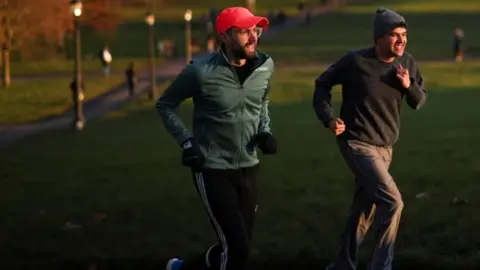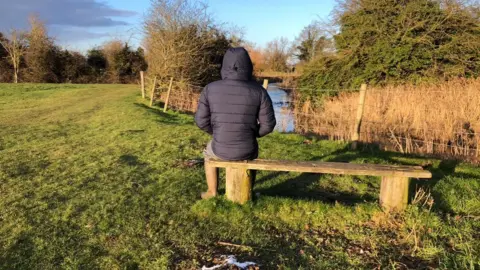Covid-19: London sees boom in walking as pandemic changes lifestyles

 Reuters
ReutersMore and more of us are walking as part of our daily exercise regimes because of the coronavirus pandemic.
A recent Transport for London report said 31% of Londoners chose to walk instead of using a different mode of transport last year.
Figures also show 57% of people say they now go on more walks for exercise or walk for longer than they did before the pandemic.
Even in the latest lockdown, places like Richmond Park, Greenwich Park and Hyde Park have been full of people walking and exercising.
'Discover something new'
Due to current restrictions, walking is the only form of exercise many can do but after a stressful day of working from home, a walk can really improve your mood.
It's also good for your physical health and you may even discover something new on your doorstep that you wouldn't have previously had the chance to find.
In my case, I have discovered the beauty of the chalk stream - an attractive feature of the Chilterns landscape.
Chalk streams are different to ordinary rivers and are fed by water stored in chalk aquifers.
They have a special place in nature and there are only 200 or so of them in the world.
This makes them extremely rare habitats for wildlife and many of them are a stone throw away from London.
Many have been suffering due to over abstraction by water companies.
Experts also say more pressure is being put on streams due to the increasing growing season of plants which has been been caused by climate change.

Before the first lockdown, I went for a little stroll down a dried up stream with former Undertones front man Feargal Sharkey.
Thankfully, the chalk stream I often walk along seems to be in reasonable health
However, Mr Sharkey thinks this will be short lived.
"After two consecutively wetter than average winters, our chalk streams are flowing again," he says.
"Full of vitality and life, but beneath that glorious, bright exterior the dead-hand of over abstraction and sewage pollution still lurks.
"Like the voice of a long-lost relative, speaking through the grinding movement of glass on a Ouija board, treasure it, for tomorrow it will be gone."
